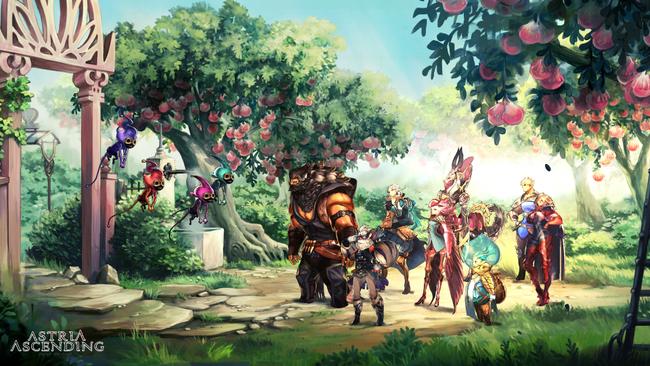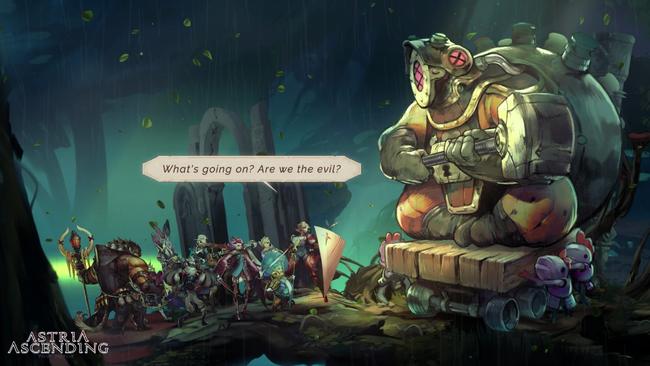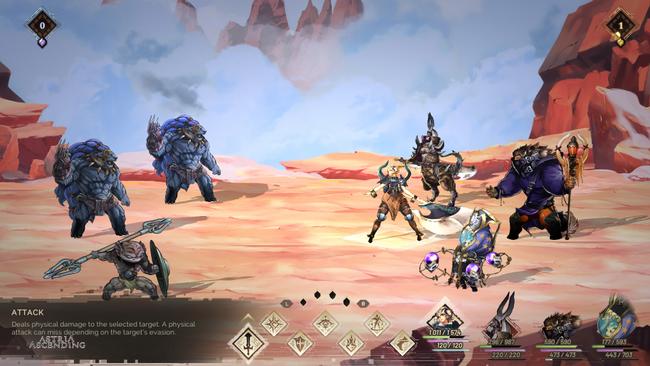Astria Ascending Review
2021 has been a very good year for JRPGs. In January, Atelier Ryza 2: Lost Legends and the Secret Fairy built upon the strong foundation of its predecessor and delivered something extraordinary. By the end of the following month, Ys IX: Monstrum Nox and Bravely Default II both delivered addictive gameplay and memorable tunes. From sterling revisits like SaGa Frontier Remastered and NieR Replicant ver.1.22474487139 to an instant classic in a long-running franchise with Tales of Arise, we've all been spoiled by a veritable deluge of high-quality helpings.
On paper, Astria Ascending has all of the necessary ingredients to join this luscious list. Legendary Final Fantasy scribe Kazushige Nojima contributes his literary talents! Famously atmospheric composer Hitoshi Sakimoto is on board for the soundtrack! The 2D visuals are brimming with style! But ingredients alone cannot bake a cake. After spending over 50 hours with developer Artisan Studios' talent-packed title, I cannot say I'm satisfied.

Astria Ascending's presentation is its greatest strength. It's difficult not to draw immediate comparisons to Vanillaware fare like Dragon's Crown — which is no small compliment in an age when so many JRPG publishers are pushing for vast 3D worlds and missing the mark on one technical level or another. Everywhere you turn, you're bound to see something pretty popping out of the background like a polished gem. This dedication to detail gives the game's diverse biomes the edge they need so as not to overstay their welcome because it is no exaggeration to say you'll be seeing the same zones again and again by journey's end.
The first qualitative red flag I encountered occurred just moments into my time with Astria Ascending. As I ventured as far to the right of an area as I could — and we all know that moving from left to right is the most basic of 2D gaming basics — I was abruptly met by a warning that I could not progress because the following spot was too dangerous.
Perhaps this is a good time to discuss the game's narrative hook; it flies in the face of that warning and the plethora of similarly forced stopgaps throughout the campaign. You have full control of all eight playable characters from the game’s onset, each of whom is a veteran of many conflicts as they near the sad end to their three-year stint as heroes. (At the closing of their third year as "demi-gods," they're fated to kick the bucket. It's a whole thing.) These are canonically capable warriors. Being told they're blocked off from dangerous spaces makes about as much sense as Aragorn and friends opting not to take to the field in Return of the King because some random Minas Tirith NPC tells them they could get hurt.
Of course, sooner or later either the main plot or some scattered sidequest will come along and open the path to these places, at which point you'll likely find yourself at the beginning of a dungeon. These dungeons will invariably include light platforming aspects, but there are no challenging jumps to be made nor particularly head-scratching puzzles to be solved. Once you've finished mopping up monsters and watched a cutscene or two, you'll be back outside the dungeon in one of the several zones linking together the game's cities. In all likelihood, your quest will then bring you back to one of those cities, upon which a chunk of inane dialogue will play out propelling you forward to your next destination.

Speaking of dialogue, prepare yourself for some real rough patches. Some JRPGs suffer in this regard through barrages of poor-taste fanservice and other embarrassing tropes like weak-kneed women or utterly incredulous antagonists. Astria Ascending does occasionally dabble in these semi-staples of the role-playing genre, but its real crime is its moment-to-moment scriptwriting. For all his accolades, Kazushige Nojima's record is far from infallible; for every fantastic Final Fantasy X he's written, there's something closer in quality to that game's relatively recent novella. While it's true that no one in Astria Ascending gets their head blown off by a bomb disguised as a blitzball, the routine ineptitude of these chosen heroes might make you wish otherwise by the time they've saved the world.
There are glimmers of goodness in Astria Ascending's storytelling. The game dips its toes in dark themes with an at-times surprisingly adult approach, taking the training wheels off its stilted script to deliver something stronger. These flashes in the pan seldom involve the leading cast, but they do serve to enrich a setting in desperate need of decent depiction.
If the saga of these eight protagonists is a dud, Astria Ascending needs a gripping battle system to keep players engaged. For a mercy, the game's fights are a broadly fun affair, serving up a fairly fast-paced turn-based framework ripe with meaningful choices. The choice to spend a character's turn charging their Focus Bar to unleash more powered-up attacks further into a fight might not seem especially worth it during the early goings, but as the difficulty ramps up and an increasing number of foes heal themselves aplenty, the option of stocking up Focus for a volley of deadly slashes or elemental spells becomes steadily more appealing.

The fun is compounded by beautifully constellation-like skill trees custom-tailored to each character. There aren't a lot of real game-changing techniques to be found in these trees, but there's a thrill to be found in unlocking piece after piece on such stylish boards. It does feel like progression is somewhat of an ordeal; abilities unlock at a snail's pace, mirroring the biggest issue with the battles themselves: glacial pacing. For all the bells and whistles and flashy effects, most clashes in Astria Ascending drone on overlong. Artisan Studios frequently swaps savvy enemy AI for HP sponges, dulling any sense of accomplishment.
Sakimoto's musical score has its highs and lows, though the bulk of his tracks fall somewhere in the middle. Still, there's a freshness here - a clear decision to shake up his more traditional sounds - that should be applauded. Even the weaker pieces differentiate themselves enough from his work on games like Final Fantasy Tactics and Final Fantasy XII that those with lower opinions of the composer's output might find themselves well and truly surprised. The same aural praise cannot be given to the voice acting; the English side varies from mediocre to downright awful, and even in Japanese, the game is unlikely to win any vocal awards.
Astria Ascending is not a great JRPG. I would hesitate to label it a good one. In a year of winners, it's not a complete outlier but it's no contemporary classic. Despite a few flirtations with intrigue, the story is generally vacant of anything compelling enough to stick around until the credits. Poor writing compounds the problem and unlikable characters can't overcome it. Gameplay ranges from strong to stale, with just enough gumption and innovation to keep things lively. Pound for pound and for all its pedigree, this is a disappointing experience I'm not inclined to recommend.